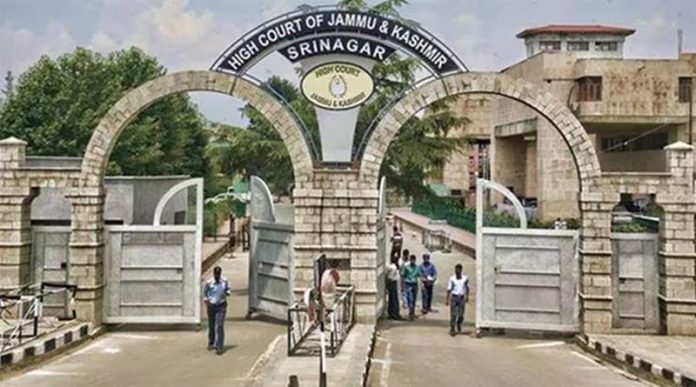‘Courts can’t act as Appellate Authorities’
*Upholds decision of SDA to cancel allotment of plots
Mohinder Verma
JAMMU, Nov 8: High Court of Jammu & Kashmir and Ladakh has held that policy decisions of the Government, which are rational, logical and have reasonable classification are not susceptible to judicial review provided authorities violate constitutional provisions or transgress statutory powers.
The bench of Justice Wasim Sadiq Nargal was dealing with a petition seeking quashment of impugned order dated 1st of June 2010 passed by Srinagar Development Authority (SDA) whereby allotment of residential plots under the category of “innocent victim of terrorist violence” and “general category” were cancelled/withdrawn.
The petitioner—Ayesha Mehmood, whose father had fallen victim to terrorist violence, was allotted residential plot under Middle Income Group (MIG) category (victim of militancy) subject to fulfillment of all formalities.
It was specific case of the petitioner that in spite of the fact that she deposited 90% of the cost of the residential plot, the respondent-Srinagar Development Authority has illegally and arbitrarily not executed the formal agreement in her favour and in an illegal and unlawful manner withdrawn the letter of intent issued in favour of the petitioner along with her brother.
However, respondents submitted that petitioner had applied for allotment of plot under the category of “innocent victim of terrorist violence” and her brother namely Javed-ur-Rehman applied for allotment for plot under “General Category” and both of them have filed an affidavit to the extent that they comprise of different families and does not own any plot /house in the city/town in which allotment was sought.
It was further submitted by the respondents that one Abdul Salam Mir filed a complaint that the petitioner and her brother comprise of single family and accordingly the matter was verified and Tehsildar concerned submitted that the petitioner and her brother comprise of single family and have common “Chullah” as a result of which the plots were cancelled.
After hearing Senior Advocate R A Jan with Advocate Aadil Mushtaq for the petitioner and Deputy Advocate General Syed Musaib for the respondents, High Court observed that Clause 7 of the Advertisement Notice under which the applications for allotment of the plots have been sought clearly states that “only those applicants are eligible to apply, whose family does not possess/own any land or house/flat in Srinagar Urban area or has not been allotted any plot or house by the Srinagar Development Authority, J&K Housing Board, House and Urban Development Department or any agency of the Government”.
“The petitioner and her brother have obtained two plots by suppressing material facts which warrants cancellation of the plots”, High Court said, adding “the record reveals that the objections filed by the petitioner were considered by the respondents and both the petitioner and her brother could not produce any documentary evidence to disapprove the report filed by the Tehsildar Kupwara”.
High Court said, “it is settled proposition of law that policy decisions which are rational, logical and have reasonable classification with the objects sought to be achieved are not susceptible to judicial review”. The High Court was fortified by the view taken by the Supreme Court that while exercising the power of judicial review of administrative action, the court is not the Appellate Authority and the Constitution does not permit the court to direct or advice the executive in the matter of policy or to sermonize qua any matter which under the Constitution lies within the sphere of the legislature or the executive, provided these authorities do not transgress their constitutional limits or statutory powers.
The Supreme Court has already held that the scope of judicial enquiry is confined to the question whether the decision taken by the Government is against any statutory provisions or is violative of the fundamental rights of the citizens or is opposed to the provisions of the Constitution. Thus, the position is that even if the decision taken by the Government does not appear to be agreeable to the court, it cannot interfere.
“I am also fortified by the view of the Apex Court that courts do not and cannot act as Appellate Authorities examining the correctness, suitability and appropriateness of a policy. The scope of judicial review when examining a policy of the Government is to check whether it violates the fundamental rights of the citizens or is opposed to the provisions of the Constitution, or opposed to any statutory provisions or manifestly arbitrary”, Justice Nargal further said.
Accordingly, High Court dismissed the petition and upheld the order of the Srinagar Development Authority.


